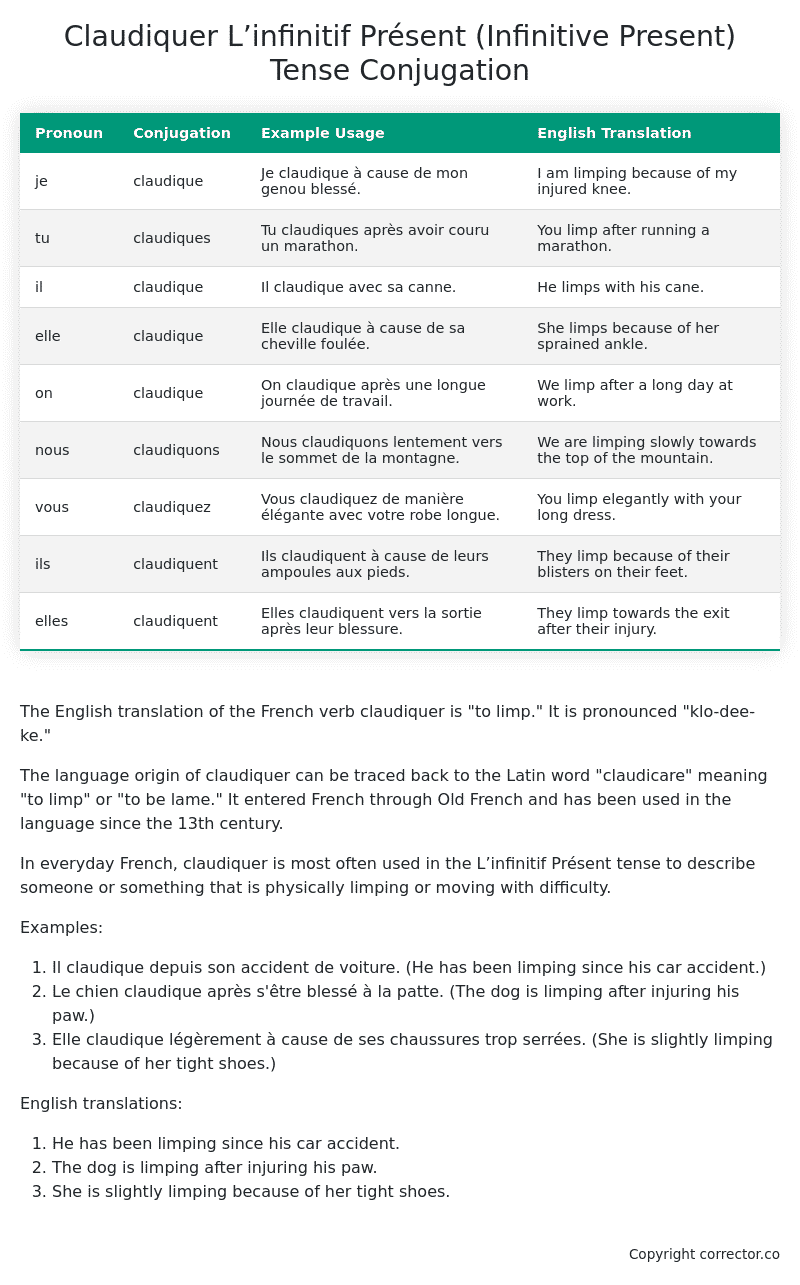L’infinitif Présent (Infinitive Present) Tense Conjugation of the French Verb claudiquer
Introduction to the verb claudiquer
The English translation of the French verb claudiquer is “to limp.” It is pronounced “klo-dee-ke.”
The language origin of claudiquer can be traced back to the Latin word “claudicare” meaning “to limp” or “to be lame.” It entered French through Old French and has been used in the language since the 13th century.
In everyday French, claudiquer is most often used in the L’infinitif Présent tense to describe someone or something that is physically limping or moving with difficulty.
Examples:
- Il claudique depuis son accident de voiture. (He has been limping since his car accident.)
- Le chien claudique après s’être blessé à la patte. (The dog is limping after injuring his paw.)
- Elle claudique légèrement à cause de ses chaussures trop serrées. (She is slightly limping because of her tight shoes.)
English translations:
- He has been limping since his car accident.
- The dog is limping after injuring his paw.
- She is slightly limping because of her tight shoes.
Table of the L’infinitif Présent (Infinitive Present) Tense Conjugation of claudiquer
| Pronoun | Conjugation | Example Usage | English Translation |
|---|---|---|---|
| je | claudique | Je claudique à cause de mon genou blessé. | I am limping because of my injured knee. |
| tu | claudiques | Tu claudiques après avoir couru un marathon. | You limp after running a marathon. |
| il | claudique | Il claudique avec sa canne. | He limps with his cane. |
| elle | claudique | Elle claudique à cause de sa cheville foulée. | She limps because of her sprained ankle. |
| on | claudique | On claudique après une longue journée de travail. | We limp after a long day at work. |
| nous | claudiquons | Nous claudiquons lentement vers le sommet de la montagne. | We are limping slowly towards the top of the mountain. |
| vous | claudiquez | Vous claudiquez de manière élégante avec votre robe longue. | You limp elegantly with your long dress. |
| ils | claudiquent | Ils claudiquent à cause de leurs ampoules aux pieds. | They limp because of their blisters on their feet. |
| elles | claudiquent | Elles claudiquent vers la sortie après leur blessure. | They limp towards the exit after their injury. |
Other Conjugations for Claudiquer.
Le Present (Present Tense) Conjugation of the French Verb claudiquer
Imparfait (Imperfect) Tense Conjugation of the French Verb claudiquer
Passé Simple (Simple Past) Tense Conjugation of the French Verb claudiquer
Passé Composé (Present Perfect) Tense Conjugation of the French Verb claudiquer
Futur Simple (Simple Future) Tense Conjugation of the French Verb claudiquer
Futur Proche (Near Future) Tense Conjugation of the French Verb claudiquer
Plus-que-parfait (Pluperfect) Tense Conjugation of the French Verb claudiquer
Passé Antérieur (Past Anterior) Tense Conjugation of the French Verb claudiquer
Futur Antérieur (Future Anterior) Tense Conjugation of the French Verb claudiquer
Subjonctif Présent (Subjunctive Present) Tense Conjugation of the French Verb claudiquer
Subjonctif Passé (Subjunctive Past) Tense Conjugation of the French Verb claudiquer
Subjonctif Imparfait (Subjunctive Imperfect) Tense Conjugation of the French Verb claudiquer
Subjonctif Plus-que-parfait (Subjunctive Pluperfect) Tense Conjugation of the French Verb claudiquer
Conditionnel Présent (Conditional Present) Tense Conjugation of the French Verb claudiquer
Conditionnel Passé (Conditional Past) Tense Conjugation of the French Verb claudiquer
L’impératif Présent (Imperative Present) Tense Conjugation of the French Verb claudiquer
L’infinitif Présent (Infinitive Present) Tense Conjugation of the French Verb claudiquer (this article)
Struggling with French verbs or the language in general? Why not use our free French Grammar Checker – no registration required!
Get a FREE Download Study Sheet of this Conjugation 🔥
Simply right click the image below, click “save image” and get your free reference for the claudiquer L’infinitif Présent tense conjugation!

Claudiquer – About the French L’infinitif Présent (Infinitive Present) Tense
Forming the Infinitive Present
Common Everyday Usage Patterns
As a Verb’s Dictionary Form
After Modal Verbs
As an Imperative
In Infinitive Clauses
Interactions with Other Tenses
Present Tense
Future Tense
Conditional Tense
Passé Composé
Imperfect Tense
Subjunctive and Conditional Moods
Summary
Want More?
I hope you enjoyed this article on the verb claudiquer. Still in a learning mood? Check out another TOTALLY random French verb conjugation!


